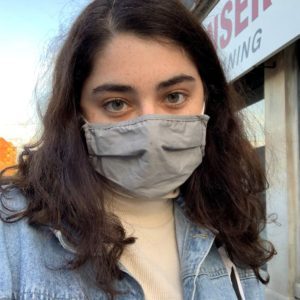“I think and hope that this has been a year of expansion for me.”
During the last meeting of the Jewish Media Fellowship, Rena Yehuda Newman, editor in chief of New Voices Magazine and fellowship program coordinator, asked the fellows to write following the prompt “Jewish media is…”. The above quote is the first thing that came to mind when I put pencil to paper.
This year I was placed with Lilith Magazine, a publication I have read and respected since I first learned about Jewish feminism. Being an intern on Lilith’s staff was unlike anything I had been a part of before; I was listened to and included as if I were a full time professional staff member, and I feel honored to have formed such strong connections with the editors and other interns. I also had the opportunity to write pieces expanding upon my interests within the Jewish community, especially surrounding the work I have done around sexual misconduct in Jewish youth spaces. A blog post I created last November was featured in the Winter 2022 issue in a spread entitled “Harassment in the Reform Movement”, and in February my writing was referenced in the footnotes of the URJ Independent Investigation of sexual conduct within the organization. Throughout the long processes of writing and editing, I felt supported and encouraged by my Lilith mentors. Beyond publishing work however, I am glad to say I have learned so much about how I learn and what subjects I want to engage with, what conversations interest me and importantly, what topics I can’t be compelled to comment upon. As Rena Yehuda once put it to me, I am striving to notice when I’m noticing things.
In a previous fellowship I did with New Voices last spring, I remember Rena Yehuda often repeated a phrase, “Writers have bodies too!” and encouraged us to stretch often during Zoom meetings. During the earliest days of the pandemic when dread locked our bodies down and we connected with one another through virtual means, this was less of a friendly comment and more of a radical reminder that we are more than the thoughts within our minds, more than the work we can produce. Even now I still feel like I live primarily within my own head, especially during the academic year when I spend so much of my time and energy reading, taking notes, and writing papers. This simple bit of advice, whenever I remember it, always compels me to pause at my computer and take stock of the way my arms and fingers and shoulders feel, sore and heavy, cramped and craned. I always feel shocked, like an infant noticing my limbs and rolling my joints for the very first time.
Like almost everyone I know, my relationship with my body changes daily, sometimes even hourly. Intrusive thoughts full of judgment are never far from my mind, even at this time in my life where I feel at ease with the way I look, possibly for the first time. This year, Jewish media connected me with the essential understanding that our bodies are as dynamic as the issues we would otherwise raise in our writing; we can talk about shame and weight and dysmorphia and nudity in every way we desire, from any perspective we choose to inhabit. Knowing there were people older than I was, people I looked up to, that both struggled with and praised their bodies passionately enough to write about it, felt vindicating in a way I didn’t even know I wanted to be vindicated. I remember a Lilith staff meeting before the Fall 2021 “Bellybuttons” issue dropped where Susan Weidman Shneider, the fearless Lilith editor in chief, fervently defended the topic of the cover story. She brought up criticism she received from someone who thought a deep dive into navels was frivolous and irrelevant compared with Lilith’s regular fare, and her vindication of the subject lingers in my mind. The body is important, essential, and worth expanding upon.
As a writer who has spent a good portion of the last few years studying and organizing around and even just thinking about sexual violence and its prevention, being reminded that I reside within a body feels uncomfortable, almost wrong. I am inundated with scholarly articles and films and media coverage that fills me with rage and information, terror and helplessness. This past semester, a group of my friends and I felt so enraged over the culture of sexual violence on our college campus that we organized and formed the Jane Doe Collective. At our first meeting, we welcomed students and shared stories, brainstormed ideas for protests, and tried to spread the message that none of us were alone, and together we could protect one another. I left that meeting feeling a new kind of energized confidence that I know was rooted in fear, not self-assurance. It’s become a habit of mine to dive deep into my brain when I panic, residing comfortably besides the strong pillars of my acquired knowledge, reducing the person I am to a small part of me that I can fortify and fill with righteousness.
To remember that I have a body, in spite of how I may view myself, reminds me so suddenly of the perpetual vulnerability of living in a woman’s body, even more so in light of recent national events. There is no distance, no objectivity, between myself and these issues. I try my best to live the expanded life I want, to feel safe in my body and feel my brain as an extension of it, to recognize fear and be able to let it go, but I am not there yet. I could never detach the brain that worries from the body it worries over, and it shouldn’t be my goal to do so. It’s worthwhile, however, to notice the moments when I feel my entire self as one, and remember to myself the pains and fears and pleasures that shock me back into joint. In these seconds of connection, I expand.
I want to conclude this reflection with a few Jewish futurisms; the fellows first wrote in this style at the beginning of the year, and ultimately created a collective Jewish futurisms poem. These futurisms are my own personal reflections on who I am in 5782 and the person I hope I will be in five years and beyond. Expansion, to me, is the combination of knowledge, hope, and sincerity. I want to let go of the neat conclusions and vaguely rallying platitudes I’ve convinced myself I need to write, and even embody. If I want to be involved in the issues that affect me closely, I have to be completely honest. I want to be afraid and tired and feel bolstered by my friends and advocates, not by those who would rather take me at my most agreeable, my most eloquent. Jewish media is one of the places I have felt doors open within me, and I will carry the lessons I have learned this year with me forever.
–
In 5783 I will travel alone, and say as little as possible for as long as I can. This not-so-serious vow of silence will satisfy like a good meal.
In 5784 I will graduate college, fearing until the last minute something will happen to derail the ceremony, as was the case with my high school graduation. I will remember spring, summer, and fall 2020, and think about how much I grew in those short seasons.
In 5785 I will try to start a podcast. I will buy expensive recording equipment, meticulously research my topic, and record a few episodes before remembering I hate the sound of my voice on audio and delete all the files. I will be content to remove myself from the center of attention.
In 5786 I will become an early riser. I will mutter Modeh Ani to myself most mornings, singing under my breath to the tunes I remember from summer camp. I will think of the perfect shade of green, the color I have only seen on the trees in that place, and feel filled with warmth at the memory.
In 5787 I will sit at my desk to write down a list of futurisms after a horrible day. I will take heart in the possibilities of the future.
–
Thank you so much to the staff of Lilith Magazine, the other wonderful fellows – Eli, Mira, and Ariya – and Rena Yehuda Newman for bringing all of us together.

